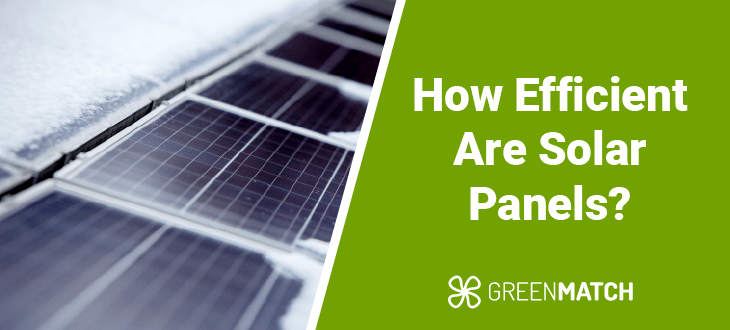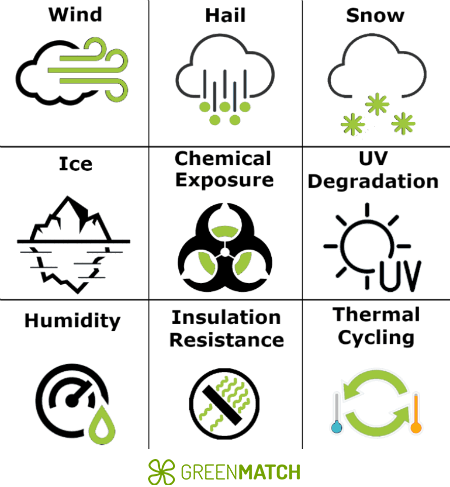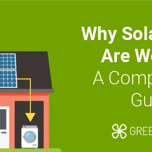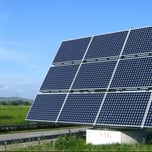Answer these simple questions and we will find you the BEST prices
Which type of solar quotes do you need?
It only takes 30 seconds
100% free with no obligation

Get up to 4 quotes by filling in only 1 quick form

Slash your energy bills by installing solar panels

For the average 2-3 bedroom house
- GreenMatch
- Blog
- How Efficient Are Solar Panels?
How Efficient Are Solar Panels in October 2025?


- Typical average solar panel efficiency is about 20% for residential systems, while more costly solar panel systems can be as much as 40% to 50% efficient.
- Monocrystalline solar panels (15 – 22% efficient) are considered the best type, followed by polycrystalline (15 – 20% efficient) and thin-film solar panels (10 – 20% efficient), being as well the most common choice.
- Extremely hot climates can also reduce efficiency with the ideal panel temperature being around 25°C (77°F).
Solar panel efficiency, the rate at which sunlight converts to electricity, varies between 15% and 22% for typical home systems. However, several key factors affect this number, including panel type, level of sunlight, and temperature.
- Panel type: Monocrystalline panels are the most efficient solar panels (15 - 22%). Polycrystalline panels, on the other hand, are 15 - 20% efficient, while and thin-film solar panels are 10 - 20% efficient. For example, the Maxeon 7 solar panel is one of the most powerful, achieving an efficiency of 24.1% in realistic rooftop settings.
- Sunlight: More sunshine and optimal solar panel angle and direction increase efficiency.
- Temperature: Hotter climates can slightly reduce efficiency (ideal temperature is around 25°C).
We recommend getting solar panels that have at least 20% and above. The best solar panels usually also have the best efficiency ratings.
For instance, monocrystalline solar panels have the highest efficiency when it comes to the efficiency of the different solar panel types. On the other hand, polycrystalline solar panels have a slightly lower efficiency rate, while thin-film solar panels are efficient but degrade faster than the other two types.
| Type of solar panel | Efficiency (%) |
|---|---|
| Monocrystalline | 15 - 22% |
| Polycrystalline | 15 - 20% |
| Thin-film | 10 - 20% |
Which Factors Determine the Efficiency of Solar Panels?
Solar panels are a great way to produce free electricity for your home, but how efficient are the different types of solar panels and what affects their efficiency levels? In this article, we’ll answer these questions about solar energy and more, and help you to understand how efficient UK-based solar panels truly are.
While we can give you a good idea of how efficient solar panels installed at your home may be, you can only get a truly accurate assessment by getting advice from a certified solar installer. This is something we can help you with.
Don't spend hours researching for solar panels in Scotland, England, Wales or Northern-Ireland. Simply spend a minute or two filling out our short form and we’ll put you in touch with up to 3 solar installers in your area. Click the button below to get started.
- Quotes from local engineers
- Payment by finance available
- Save up to £1,567 per year
It only takes 30 seconds



Solar Panel Types and their Efficiency
There are numerous types of solar panels. The most common types of solar panels are:
-
Monocrystalline solar panels
-
Polycrystalline solar panels
-
Thin-film solar panels

It is important to understand that the efficiency of an individual solar cell does not equate to the efficiency of solar panels (modules) as a system. While solar panel efficiency is generally around 15-20%, solar cell efficiency can reach 42% in some cases.
However, unless otherwise stated, the performance of solar cells is measured under laboratory conditions. Therefore, although 42% is an impressive performance, laboratory conditions are different than real life and this is not applicable to residential users.
Monocrystalline Solar Panels
Monocrystalline solar panels, also called single-crystalline cells are manufactured from the purest silicon. A crystal of this type of silicon is grown in a complex process to produce a long rod. The rod is then cut into wafers that will make the solar cells. Monocrystalline solar panels are known to deliver the highest efficiency in standard test conditions when compared to the other 2 types of solar cells. The current delivered monocrystalline solar panel efficiency stands at 22-27%. You can recognise a monocrystalline panel by the rounded edge and the dark colour.
Polycrystalline Solar Panels
Solar panels made of polycrystalline solar panels, also called multi crystalline cells are slightly less efficient than those made up of monocrystalline solar cells. That's why they are often used in producing cheap solar panels to reduce the costs. The silicon is not grown as a single cell but as a block of crystals. These blocks are then cut into wafers to produce individual solar cells. The current delivered polycrystalline solar panel efficiency stands at 15-22%. You can recognise a polycrystalline solar panel by the square cut and blue speckled colour.

Thin Film Solar Panels
Thin film solar panels are made by covering a substrate of glass, plastic or metal with one or more thin-layers of photovoltaic material. Thin film solar panels are usually flexible and low in weight. It is known that thin film solar panels degrade somewhat faster than mono and polycrystalline solar panels. Production of this kind of panels is less complex, thus their output is 5% less than monocrystalline solar panel efficiency. Normally, thin film cells deliver between 15-22% solar panel efficiency.
Thin film solar panel technology is closing the efficiency gap with more expensive types of solar panels, therefore thin film solar panels are installed on large scale projects and in record breaking solar power plants.
The Efficiency of Solar Panels Under Extreme Conditions
No single customer wants to end up with solar panels that aren't technically sound. There are major advantages of solar energy, but it's important to have the right type of solar panel installed in your home.
Bird nesting under solar panels is a common problem but it can be tackled by installing roof integrated solar panels. But what about the weather extremes? In order to guarantee the quality of a solar panel, it is extensively tested under extreme conditions.

Snow
A thick layer of snow can be too heavy for a solar panel. Solar cells stop working when more than 5 cm of snow accumulates on a solar panel and decreases solar panel efficiency by 100%. However, the tilt of solar panels allows the snow to simply glide off, and if not, then it can be manually removed.
Under normal snowy weather, solar panels can still thrive and generate electricity. There's also a possibility of the snow on the ground reflecting sunlight onto the panels.
For more information about how solar panels are still effective in the winter, check out our video below.

Wind
Wind is one of the most predicted causes of solar cell damage. Solar panel manufacturers conduct extensive wind tunnel testing to decrease potential damage. According to Research Gate, a slight decrease in solar panel efficiency is observed with the increase in wind velocity.
Having said that, the wind has some positive effects as well. The effect of wind does cool the panels and when the panels are cooled by 1 degree, the efficiency increases by 0.05%.
Cloudy weather
One of the most common questions about solar energy is, "Do solar panels work in cloudy weather?" Well, the answer is yes, they do. However, they produce 10 to 25% of their normal output, with a difference of around 0.73 GW compared to sunnier conditions.
Hail
Hail testing consists of firing artificial hail at a speed of 20 to 30 m/s. Solar cells remain undamaged at these speeds. Based on a report from NREL, the analysis of 50,000 solar energy systems installed between 2009 and 2013 show that only 0.1% of all systems have either been underperforming or have been damaged during hail. Solar panels are designed to withstand such extreme weather conditions.
Ice
Ice builds upon the surface of solar cells when no silicon coating is applied. The build-up of ice can potentially decrease solar panel efficiency by 25 to 100%.
Chemical Residue
For chemical residue to dissolve at least 20 mm of rainfall has to land on the surface of the solar cells. Research has shown a reduction of 0.2% in solar panel efficiency when they are covered in a layer of chemical build-up.
UV Degradation
A solar cell structure can be delaminated by UV-induced degradation. Another consequence can be the discoloration of individual solar cells. Due to the exposure to initial sunlight, the panel surface can form a layer of boron oxide that reduces efficiency by 1 - 3% in the first 1,000 hours.
Damp heat testing
Damp heat testing is carried out to test the durability of solar panels in highly humid conditions. Humidity can lead to corrosion and to module connection failure and an overall decrease of solar panel efficiency.
Insulation Resistance
Insulation resistance is determined by material strength. In weak materials, current leakage can occur on the edges of the solar panel.
Thermal Cycling
Thermal cycling can cause solar panel components to fail. These components include solar cells, interconnections, solder bonds and module connections.
Upon installation, it is important to consider all the factors that could influence solar panel efficiency. Moreover, it is essential to maximise output from the get go.
Extensive Testing of Solar Panel Efficiency Under Extreme Conditions
Solar panel efficiency testing is carried out in order to prevent low quality solar panels from being sold in the market. The manufacturer has to prove that the solar cells have long term durability and long term efficiency. Solar panels available in the UK market are certified by first passing extensive testing.
Usually, solar cells are tested in state of the art, fully automated solar panel testing facilities. This high standard in testing enables categorisation of solar panel efficiency in groups with similar power outputs.
4 Key Attributes When Choosing Solar Panels
-
The cost of solar panels per square meter.
-
Solar panel efficiency of the entire solar panel module.
-
Lifespan of individual solar cells.
- The Aesthetics and style of your solar panel.
To determine costs and how many panels you'll need, we've put our solar PV calculator online for easier assessment.
You may also want to factor in the storage of electricity produced by your solar panels during the day. UK homes with solar panels generate power during the day and by installing solar batteries, you can use this electricity during the evenings thereby reducing your dependency on the grid.
To help you find the best commercial solar panels and residential solar panels for your specific home, you can follow our 6-step video guide:

The Future of Solar Panel Efficiency
There is massive competition in the solar power market. Emerging countries-giants like China and India are the greatest polluters at the moment. However, this competition is expected to lead to lower prices for solar panels, as well as, more efficient storage solutions.
The change will lead to less expensive and more efficient solar power modules that can easily be installed in your home.
Solar panel affordability and efficiency have improved dramatically over the past decades. The UK government, through various solar panel grants, has been incentivising households to opt for renewables to power their homes. On the other hand, researchers are continuously looking at improving the efficiency rate of photovoltaics to make the most out of solar power.
We make the process of choosing the most efficient solar panel easier and simple by proving you free, non-binding quotes from different suppliers. Simply fill in the contact form at the top of the page, stating your needs and preferences and we will get back to you with the sharpest quotes.
- Quotes from local engineers
- Payment by finance available
- Save up to £1,567 per year
It only takes 30 seconds




Aris Vourvoulias was the Head of Content in GreenMatch. Aris is a passionate author and marketer with an educational background in journalism. He continuously writes, reviews, and educates himself in the areas of business, finance, and renewable energy. He has managerial experience in many European markets, including UK, Denmark, Sweden, and Finland. He and his content team have been featured on reputable sites like GreenPeace, Guardian, iNews, Gizmodo, and more

We strive to connect our customers with the right product and supplier. Would you like to be part of GreenMatch?

Stay up to date with energy saving tips and grant alerts
Receive offers, marketing and promotions via email from Leads.io about GreenMatch and our brands/partners to help you save.
Thank you for subscribing to our newsletter!
Your email has been successfully added to our list. We look forward to sharing our latest updates with you soon!




